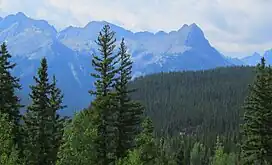| Needle Mountains[1] | |
|---|---|
 Needle Mountains seen from the San Juan Skyway. | |
| Highest point | |
| Peak | Windom Peak |
| Elevation | 14,093 ft (4,296 m) |
| Listing | Mountain ranges of Colorado |
| Coordinates | 37°37′19″N 107°37′22″W / 37.62194°N 107.62278°W |
| Geography | |
 Needle Mountains[4] | |
| Country | United States |
| State | Colorado |
| Parent range |
|
The Needle Mountains are a subrange of the San Juan Mountains of the Rocky Mountains located in the southwestern part of the U.S. State of Colorado. Much of the range is protected in the Weminuche Wilderness of the San Juan National Forest. The range is notable for having some of the most rugged mountains in the state, and includes many technical climbs and scrambles. A small but dramatic east–west subrange in the northern section is known as the Grenadier Range.
Geology
Unlike the rest of the San Juan Mountains, which are volcanic in origin, the Needle Mountains (along with the Grenadier Range) are a mass of uplifted Precambrian rocks. They consist chiefly of quartzite, granite, and amphibolite. The mountains are referred to as the Needle Mountains Uplift.[5][6]
Notable peaks
- Windom Peak, 14,093 ft
- Mount Eolus, 14,090 ft
- Sunlight Peak, 14,065 ft
- Pigeon Peak, 13,978 ft
- Vestal Peak, 13,870 ft (Grenadier Range)
- Turret Peak, 13,841 ft
- Jagged Mountain, 13,830 ft
- Arrow Peak, 13,809 ft (Grenadier Range)
- Animas Mountain, 13,786 ft
- Storm King Peak, 13,752 ft (Grenadier Range)
- Mount Silex, 13,628 ft
- The Guardian (Colorado), 13,617 ft
- Leviathan Peak, 13,528 ft
- Graystone Peak 13,489 ft
- Vallecito Mountain, 13,428 ft
- Mount Garfield, 13,074 ft
References
- ↑ "Needle Mountains". Geographic Names Information System. United States Geological Survey, United States Department of the Interior.
- "Needle Mountains". Geographic Names Information System. United States Geological Survey, United States Department of the Interior.
- "Needle Mountains". Geographic Names Information System. United States Geological Survey, United States Department of the Interior.
- ↑ "Needle Mountains". Geographic Names Information System. United States Geological Survey, United States Department of the Interior.
- ↑ Barker, Fred (1969). Precambrian Geology of the Needle Mountains, Southwestern Colorado (PDF). Washington: United States Government Printing Office.
- ↑ Barker, Fred (1969). "A brief geological history of the Precambrian rocks of the Needle Mountains, southwestern Colorado". In Shomaker, J.W. (ed.). San Juan, San Miguel, La Plata Region (New Mexico and Colorado). Fall field conference guidebook ; 19. New Mexico Geological Society. pp. 148–149.